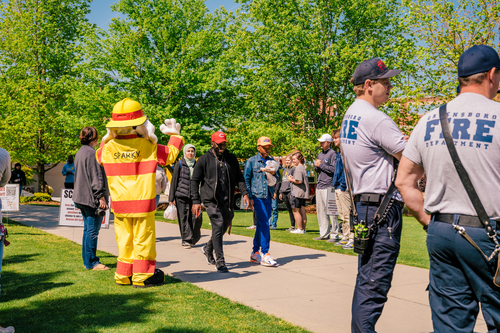Greensboro, North Carolina — In early 2023, the city of Greensboro, North Carolina experienced a rash of deadly fires, bringing tragedy to local neighborhoods.
College campuses across the U.S. are certainly not immune to destructive blazes. According to the Greensboro Fire Department, the Spring Garden Apartments on UNC Greensboro’s campus is a frequently visited location for its firefighters.
The Value of Service-Learning
To help improve fire safety both on campus and in the local community, two UNCG communication studies classes teamed up with the Greensboro Fire Department for the spring 2023 semester. Through Dr. Kristen Christman’s Communication and the Community courses, students raised awareness about the dangers of unattended cooking among their UNCG peers, provided free smoke alarms to Greensboro’s most at-risk neighborhoods, and participated in a variety of other community service projects.
Projects like these epitomize UNCG faculty’s commitment to academic service-learning and community engagement.
“Service-learning offers a unique and valuable opportunity for students to integrate their learning, contribute to their communities, and develop as individuals,” said Christman, who has been teaching community-engaged courses at UNCG for more than 15 years. “Through hands-on experience, students gain so many transferable skills such as critical thinking, communication, teamwork, leadership, and problem-solving, to name a few.”
Fire Safety Walk, Free Smoke Alarms and More
Unattended cooking is one of the primary causes of fires on college campuses. To help educate UNCG students about this danger, Christman’s students organized a “fire safety walk” and communication campaign on campus during the last week of classes.
Greensboro firefighters – along with Sparky, the mascot for the National Fire Protection Association – were on hand to assist as students shared flyers, statistics, and tips about cooking safety with their peers.
The fire safety walk was the culmination of a series of community projects that students participated in all semester long. Students also went door-to-door in the Grimsley neighborhood, providing free smoke alarms and education to citizens.
Academic Service-Learning: A ‘High-Impact Practice’
UNCG has long held a reputation for establishing meaningful community partnerships. Service-learning is considered a high impact practice (HIP) by the American Association of Colleges and Universities. High impact practices are student experiences that, according to research, lead to deep student learning, engagement, and satisfaction.
“Service-learning has reciprocal goals,” said Christman. “In this case, students helped extend the reach of the Fire Department’s Fire and Life Safety Division, leading to further community exposure. In return, students were exposed to the breadth and depth of the Greensboro Fire Department’s work in the community.”
While UNCG does not have a university-wide service-learning requirement, many academic departments institute their own service requirements for majors.
The Department of Communication Studies, for example, requires all of its majors to take the Communication and the Community course before they graduate, and this course expects that each student complete 15-20 hours of community service.
Similar community-based coursework is offered across the University. According to the most recent statistics, a total of 3,995 UNCG students were enrolled in community-engaged courses in the academic year of 2020-2021, and 929 of those were enrolled in service-learning courses.
It’s easy to see service-learning’s “high impact” through the experience of one recent UNCG communications studies graduate, Ben Lambe ‘23.
“I took Professor Christman’s Communication and the Community class my junior year and fell in love with the core concepts of service-learning, reflection, and community-building,” said Lambe. “As college students, we can become very disconnected from our communities, so service-learning is an incredible way to foster community and discourage isolation.”
Through the course, Lambe not only contributed tangibly to his community, but he also secured leadership and internship positions. He was invited to serve as a peer leader in Christman’s spring 2023 classes, and he was appointed the community engagement intern for the Greensboro Fire Department.
Through his internship, Lambe utilized his communication skills in public relations and served as a liaison between UNCG and the fire department, coordinating events and ensuring student-volunteers had the information needed to complete their service-learning requirement.
Like many new graduates, Lambe isn’t certain where his path will lead. But he does know that his service-learning and internship experiences have shaped his trajectory for the better – and he will carry this commitment to community service wherever he goes.
“Through service-learning, you get to see people – really see them,” said Lambe. “There is something so pure about doing life – doing the hard things alongside others. You are no longer the sum of your differences; you are your goal of serving others.”
UNC Greensboro
Located in North Carolina’s third largest city, UNC Greensboro is among the most diverse, learner-centered public research universities in the state, with nearly 18,000 students in eight colleges and schools pursuing 175 areas of undergraduate and 250 areas of graduate study. UNCG continues to be recognized in national publications for academic excellence, access, and affordability. For the fourth consecutive year, U.S. News and World Report ranked UNCG No. 1 in North Carolina for social mobility — helping more first-generation and lower-income students find paths to prosperity than any other public university in the state. With a portfolio of more than $56M in research and creative activity, UNCG’s nearly 1,000 faculty and 1,700 staff help create an annual economic impact for the Piedmont Triad region in excess of $1B.













